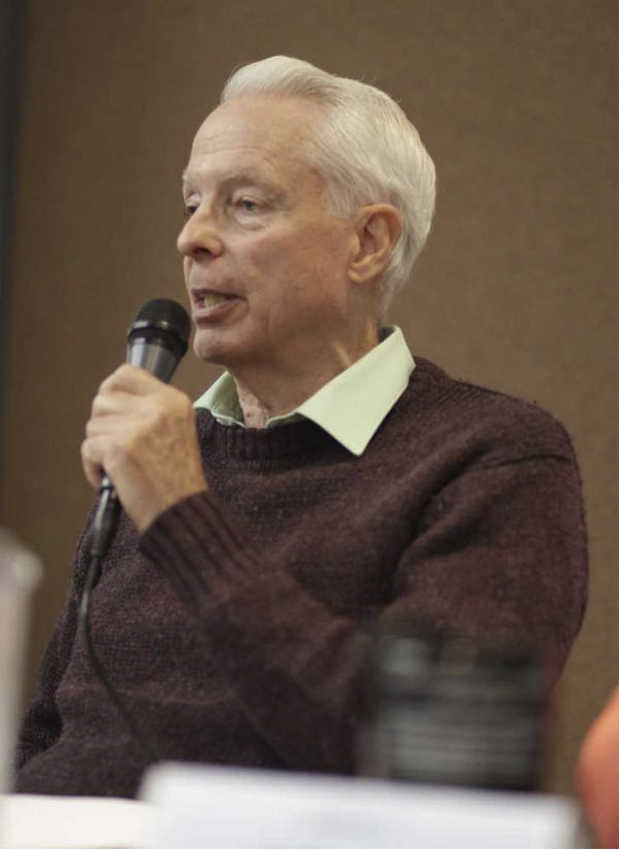As the new kid on the block, Stan Welles has been tuning into issues in his district since he moved to Sterling in 2012 after spending 20 years in Homer.
For nearly 10 years, Welles owned Pioneer Pizza in Homer, managed by his son Luke Welles. He hosted a variety of Alaska politicians for public meet and greets, until the family closed the pizza parlor down in 2001.
Welles settled into a home on the Moose River with his wife Nikki Welles.
After some encouragement from his peers, he decided to run for Sterling and Funny River district seat for Kenai Borough Assembly. Welles met with current assemblyman Charlie Pierce, who is term-limited out, to gain more perspective of what the job entailed.
“I was burdened with the issues on the table,” he said. “Frankly, the only way to keep our freedom is participating in our own governance. I felt a sense of responsibility to participate.”
Welles said to be an assemblyman means stewardship of other people’s assets, a responsibility he takes seriously with a great deal of accountability.
With a background in aerospace engineering, Welles has always looked at problems analytically. In his research of the Kenai Peninsula Borough budget, he said education makes up 65 percent of the expenditures. Over the last eight years, education expenses have increased by $42 million, yet there has been a reduction in students and an increase of staff, he said.
From 2005 to 2013, the number of students has dropped while the number of employees increased, he said. In the meantime, Alaskan students ranked 52nd out of 107 states and countries on standardized math test scores a proxy that gauges educational achievement, according to a 2010 article in the Atlantic Monthly Magazine he cited.
“All government entities like to tax excessively and have a big tendency to throw money at projects without looking at parameters that measure production,” Welles said. “In my world I look for metrics that adequately measure production. It looks to me like we are not applying those.”
Welles said the Kenai Peninsula Borough School District has spent close to $5,000 per student, compared to $3,000 per student spent by the Mat-Su Borough.
“Why should we spend more and not get anything for it?” he said. “Money is not the answer. I believe we have bigger issues in our schools.”
Welles grew up on a dairy farm in upstate New York owned by his family since 1792. The farm neighbors an airport where Welles got into flying and developed an interest in aerospace engineering. In his professional business experience he has done contract work for Boeing and worked as a senior mechanical engineer with AMAX Henderson Molybdenum Millsite, a mining operation in Clear Creek County, Colorado.
At AMAX, he had $34 million worth of trains to babysit on 92 miles of track 5,000 feet underneath the continental divide. He said Colorado has some of the most restrictive mining requirements in the country to protect waterways and would like to see work on the Pebble Mine in Bristol Bay do the same.
“We have a huge amount to contribute to our republic with our natural resources and we can do so responsibly,” Welles said. “No doubt they will increase the fishery and be a productive alternate revenue for the state of Alaska. We shouldn’t have a negative attitude toward mining.”
With the anticipation of job growth and industrial development with the project proposing to build a liquefied natural gas facility in Nikiski, Welles said he wishes the borough could enhance its tax base and lower the mill rate. He said he has a dream that borough sales tax could return to 2 percent.
“On the cautionary side with every aspect of development, every entity that spends money will see this as a golden opportunity for them to increase their budget,” he said. “Everybody will be looking through rose-colored sunglasses. It’s important to move carefully and look at where demands are and be prudent.”
Welles said the Sterling and the Funny River area would be affected by population growth with an increase of residential demands and support businesses coming to the area.
On the issue of the anadromous stream ordinance, which the borough passed last June to protect salmon habitat protection along lakes and streams, Welles said he was not happy about the exhortation of property rights by the borough administration.
Welles said he has experience with erosion issues with a trout stream that runs through his family’s farm property in New York.
He said the measures used to study river and lake banks were “nothing short than an invasion of privacy.”
Welles said he calls the findings “flawed physics and phony fishology.”
“To say the Moose River or lakes and streams with no current are affected the same as the Kenai River, give me a break,” he said. “The Kenai River has sharp bends and the velocity causes erosion which feeds the fish, gives them nutrients and a clean bed for spawning. It’s good for the fish, bad for the landowner.”
In meeting with people in the Funny River community, he said one issue people expressed to him was not having an escape route from the Funny River Horse Trail Wildfire. He said he would be in favor of putting a bridge across the Kenai River as an emergency escape in case of a future fire, if a majority of the residents were in favor.
“Disasters are hard to predict and in any given situation it’s hard to know what demands will be,” he said. “We certainly appreciate the firefighters’ efforts to save our community.”
Reach Dan Balmer at daniel.balmer@peninsulaclarion.com

